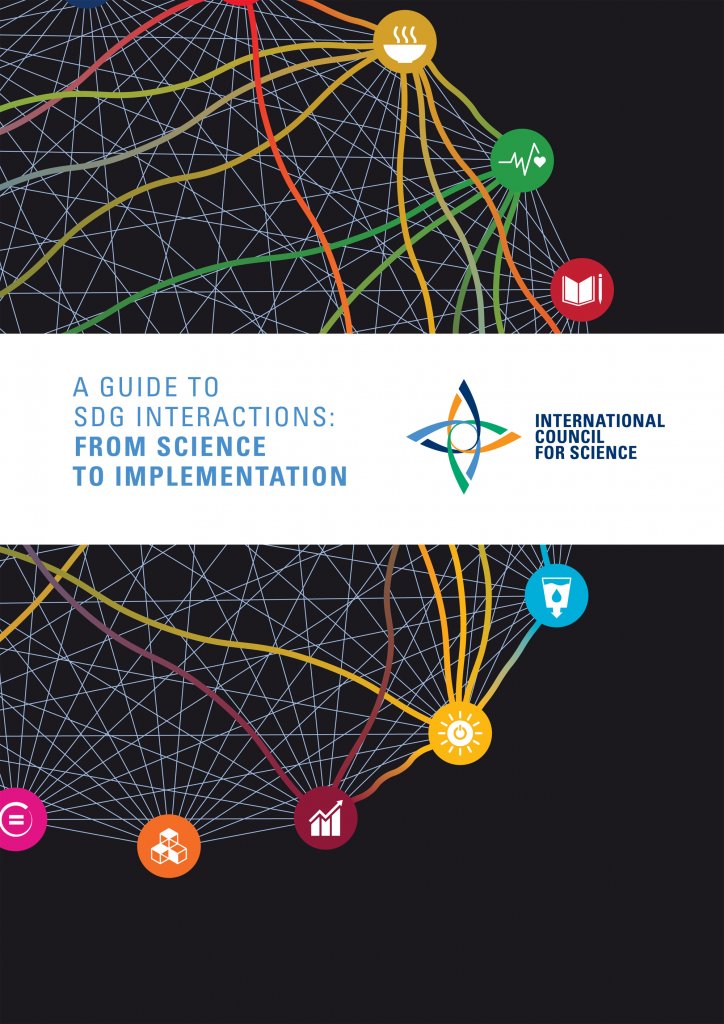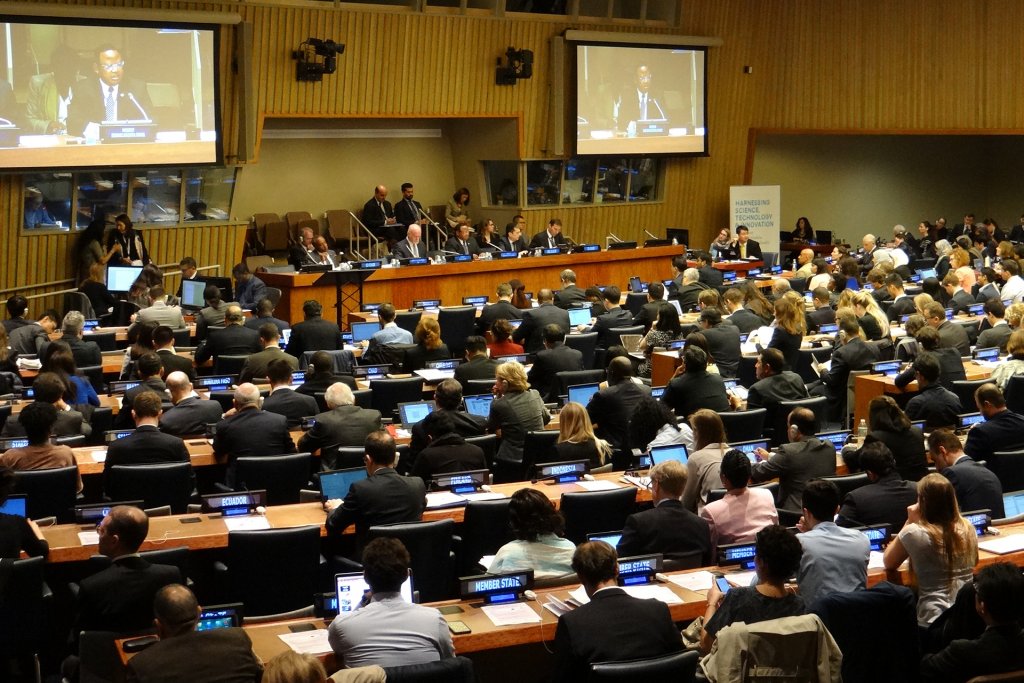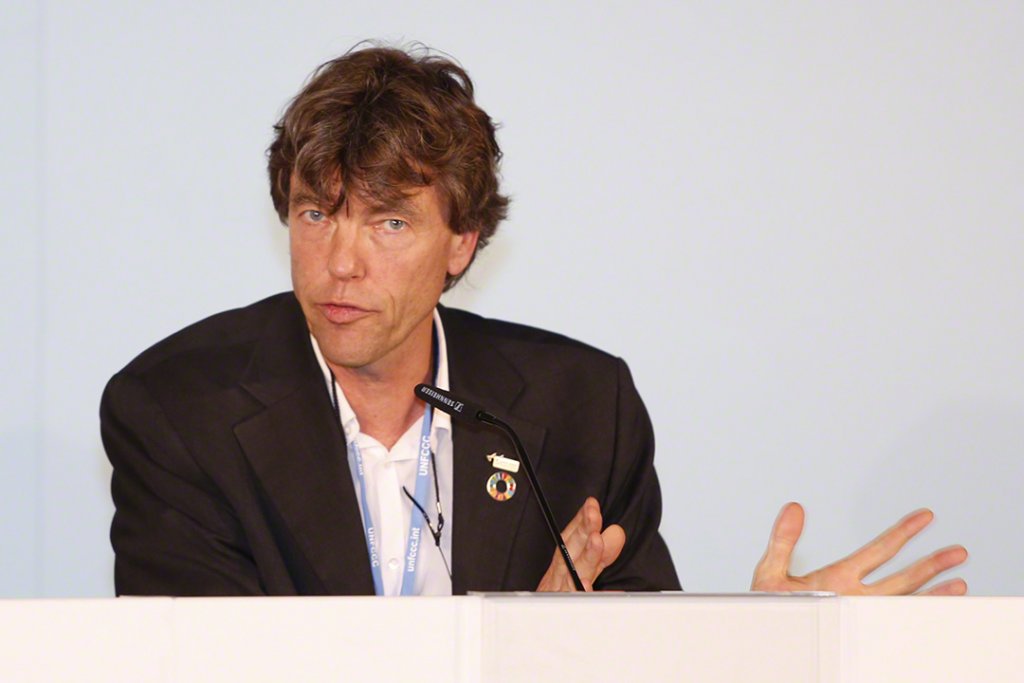4. Science for Policy

ICSU published a flagship report in May 2017 entitled: “A Guide to SDG Interactions: from Science to Implementation” as a follow-up to its 2015 report reviewing SDG targets. The report is aimed at focusing attention from both the scientific and policy communities on the need to better understand how the SDGs fit together, in order to achieve sustainable and long-lasting development outcomes. It is essentially a tool to structure a much-needed conversation between science and policy on how the SDGs can mutually support or may detract from one other, and the key role that integrated science and coherent policy-making have to play in the implementation of the SDGs, at both global and national levels.
The report presents a framework that is built around a seven-point scale that characterizes the range of positive and negative interactions that can occur across goals and targets, from one goal counteracting or even cancelling another to one creating the conditions for or even being indispensable to the achievement of another. While rating the goals on a scale gives useful insight into understanding interactions, it is important to note that the extent to which goals and targets support or conflict with one another will depend on the local context and a range of other dimensions such as geography, governance arrangements, technology, and change over time. The report includes detailed analysis of four SDGs and their interactions with other goals: SDG2: Zero Hunger, SDG3: Good Health and Well-being, SDG7: Affordable and Clean Energy, and SDG14: Life below Water.
The report is authored by 22 scientists from 8 different eight research institutions: the Institute for Advanced Sustainability Studies (IASS), the Kiel-based Future Ocean cluster, the International Food Policy Research Institute (IFPRI), the French National Research Institute for Sustainable Development (IRD), the International Institute for Applied Systems Analysis (IIASA), Monash University, the New Zealand Centre for Sustainable Cities, and the Stockholm Environment Institute (SEI). The report was reviewed by around 50 scientists from the ICSU network prior to publication.
The report was praised as a major contribution to the SDGs for countries to better understand the policy implications of the SDGs. It was presented in numerous fora throughout the year, including the STI Forum (15-16 May), the UN Ocean conference (5-9 June) and the High Level Political Forum (10-19 July). It has also been positively received by the scientific community as an analytical tool for bringing about interdisciplinary conversations across the SDGs domain and inspiring further research at both conceptual and empirical levels. The United Nations has also used the framework as a reference to collect scientific evidence on SDG interactions for the 2019 Global Sustainable Development Report.
The report has received extensive media coverage, including on the World Economic Forum blog, United Nations website, T20 Blog feeding into the G20 summit, Project Syndicate, IISD – SDG Knowledge Hub, and has been referenced by many institutions, including the OECD.4. Science for Policy

The Second Multi-stakeholder Forum on Science, Technology and Innovation for the Sustainable Development Goals (STI Forum) was held in New York on 15-16 May 2017. The meeting was co-chaired by Macharia Kamau, the Permanent Representative of Kenya to the United Nations, and Vaughan Turekian, the Science and Technology Adviser to the US Secretary of State of the United States of America. The theme of the 2017 Forum was “Science, Technology and Innovation for a Changing World”. It focused on six of the SDGs: 1, 2, 3, 5, 9 and 14. The STI Forum is an element of the UN’s Technology Facilitation Mechanism and aims to promote networking and matchmaking between the policy-makers and the roughly 400 scientists, innovators, entrepreneurs and civil society representatives participating in the meeting.
ICSU played a prominent role in representing science at the forum, highlighting its work at the science-policy interface and its new initiatives, notably in the areas of funding research for the SDGs and open data for sustainable development.
ICSU Executive Director Heide Hackmann participated in the Forum as the co-chair of the 10-Member Group representing civil society, the private sector and the scientific community and supporting the UN in the preparations of the STI Forum. She moderated a session on “Lessons learned in improving the impact of STI on the SDGs”, which included a discussion about efficient science advisory systems for the SDGs, featuring Peter Gluckman, Chair of the International Network for Government Science Advice (INGSA). In another session that discussed the means of implementation of the Technology Facilitation Mechanism, Heide Hackmann introduced ICSU’s new initiative to bring together the different science funding communities in support of research funding for the SDGs.4. Science for Policy
At the UN’s Habitat III summit in October 2016, ICSU played a key role in convening the scientific community and providing a platform for its engagement around the urban future. With its co-sponsored programmes, it advocated for a strong role for science in the New Urban Agenda, the outcome document of the conference, which aims in turn to support the implementation of Sustainable Development Goal 11 on cities.
In 2016, ICSU had joined the Research & Academia group of the General Assembly of Partners (GAP, the stakeholder platform for engagement across the New Urban Agenda). In 2017, ICSU worked with the group to institutionalize the GAP — providing input on its internal governance structures and making sure there is a role for the scientific community in the preparation of the 2018 World Urban Forum.
Since Habitat III, the scientific community has continued to further support the global urban agenda. The need for systematic, practical and evidence-based guidance for national, regional and local public and private decision-makers about sustainable urban development has grown dramatically in the wake of several important global agreements that emphasize the importance of cities and urbanization.
In 2017, ICSU continued to support science as a partner for the urban future. To advance the development of more integrated and policy-engaged research on cities, ICSU is represented on an Expert Panel on the urban science-policy interface for global sustainability — spearheaded by Nature Sustainability and the City Leadership Lab at University College London. The Panel aims to review the interface between urban science (broadly construed across STEM, social science and humanities) and policy. It will assess the viability of forging a more cohesive body of urban expertise in relation to the challenges of Agenda 2030 and SDG 11.
ICSU’s Urban Health and Wellbeing Programme co-sponsored and co-organized the 14th International Conference on Urban Health, held in Coimbra, Portugal. With close to 4000 participants, the conference focused on improving the health of people living in cities worldwide and implementation of the New Urban Agenda. ICSU also supported the participation of LIRA grantees.4. Science for Policy

On 10 November 2017, ICSU, together with the World Climate Research Programme (WCRP), co-organized a science event during COP23 in Bonn on climate change and habitability limits. The discussion was moderated by Martin Visbeck, member of both WCRP Joint Scientific Committee (JSC) and ICSU’s Committee on Scientific Planning and Review (CSPR).
Speakers presented the latest scientific insight into the impact of climate change on the human and natural environment. They gave examples where climate change impacts push some of our planet’s regions to the limits of habitability. A discussion took place on socio-economic implications of climate extremes and associated risks to human health, terrestrial ecosystems, transport infrastructures and ocean acidification, among others.
Participants concluded that despite recent advances, there remains further work to be done for science, in particular to enable the evaluation of impacts of different scenarios, which can inform climate-related decisions in the larger context of sustainable development. Speakers emphasized the relevance of continuous and systematic observations on the status of the climate, as well as free, open data and information sharing from these observing networks.
During 2017, the Intergovernmental Panel on Climate Change (IPCC) issued calls for authors to contribute to special reports on the “Ocean and Cryosphere in a Changing Climate” and “Climate Change and Land”, as well as for the IPCC Sixth Assessment Report. ICSU invited its membership to nominate representatives to be part of these processes. As a result, several representatives from the ICSU scientific community were selected to participate.